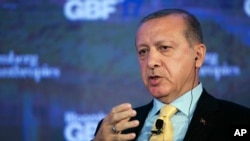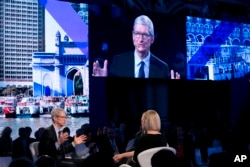Globalization faces challenges — from Britain’s planned exit from the European Union, known as Brexit, to an “America First” policy agenda under the Trump administration.
On the sidelines of the United Nations General Assembly in New York on Wednesday, business and political leaders around the world met to urge cooperation on such issues as trade, investment and international technology to help boost globalization, which many see as under threat.
“We are in a very specific moment. We have a lot of global challenges — climate change, migration, terrorism — and for that we do need multilateralism,” French President Emmanuel Macron said at the first Bloomberg Global Business Forum.
Who benefits next
Former U.S. President Bill Clinton noted harm done through globalization, which has led to a backlash from those who feel left behind.
“We are also quite well aware that a lot of people felt left out, left behind, alienated politically, socially and economically and are very much in need of a hand up to be part of the future that we now take for granted,” Clinton said.
Jack Ma, CEO of the Chinese e-commerce company Alibaba, said globalization, and the advances it is bringing, should be embraced.
Ma said that in the past 30 years, globalization benefited about 6 percent of businesses. In the next 30 years, he said the data shows “at least 60 percent of the small business will be global, will benefit from the globalization.”
Europe steps up
The European Union’s Foreign Policy chief, Federica Mogherini, said Brexit and an “America First” policy agenda set by the U.S. leadership, while challenging, had motivated unity in Europe.
“What I’ve seen in this year is that the rest of the world is now looking at Europe for leadership. And we can do it. We feel the responsibility of doing that. So, Europe is now more confident,” Mogherini said.
On the issue of U.S. leadership’s skepticism of the reasons behind climate change, Michael Bloomberg, who hosted the event, noted most scientists say the Earth is nearing a tipping point.
“I don’t know whether that’s true or not. My inclination is to believe the reputable scientists who, with peer review, come up with theories that this is what’s gonna happen,” Bloomberg said. “But one thing I do know, if there’s the remotest possibility that climate change is real, I better buy an insurance policy, I better get ready just in case. And, it is just irrational to say I don’t believe it and I’m not gonna do anything.’”
Immigration
On another controversial issue in the U.S. and Europe — immigration — Apple computer company CEO Tim Cook said talented immigrants should be recruited instead of excluded.
“I’d want every smart person coming to my country,” Cook said. “Because smart people create jobs and jobs (are) the ultimate things that create a great environment in a country, a land of opportunity, a land where everybody can do well if you work hard. These are the things that drive people, that give people a sense of purpose. And, so I’d have a very aggressive plan not just to let a few people in — I would be recruiting.”
Cook expressed shock that U.S. political leaders are even considering removing legal protections for undocumented children of illegal immigrants under the Deferred Action for Childhood Arrivals (DACA) program. About 250 DACA recipients work for Apple, he said.
“We’re pushing extremely hard on this,” he said. “This is, I think, is the biggest issue of our time currently among all the big issues. Because, this goes to the values of being American.”
Despite the challenges, Cook said he was more optimistic than ever because of the opportunity technology provides for bringing people across the world to work together.
Digital revolution
Microsoft founder Bill Gates told the forum the digital revolution was not slowing.
“And, it’s so horizontal in nature that it will change banking, education, scientific research, sales and marketing,” he said.








